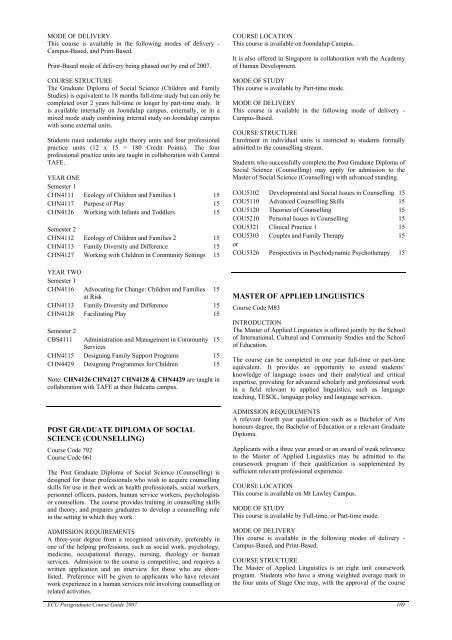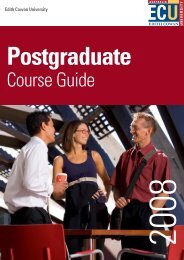Course Guide - Edith Cowan University
Course Guide - Edith Cowan University
Course Guide - Edith Cowan University
Create successful ePaper yourself
Turn your PDF publications into a flip-book with our unique Google optimized e-Paper software.
MODE OF DELIVERY<br />
This course is available in the following modes of delivery -<br />
Campus-Based, and Print-Based.<br />
Print-Based mode of delivery being phased out by end of 2007.<br />
COURSE STRUCTURE<br />
The Graduate Diploma of Social Science (Children and Family<br />
Studies) is equivalent to 18 months full-time study but can only be<br />
completed over 2 years full-time or longer by part-time study. It<br />
is available internally on Joondalup campus, externally, or in a<br />
mixed mode study combining internal study on Joondalup campus<br />
with some external units.<br />
Students must undertake eight theory units and four professional<br />
practice units (12 x 15 = 180 Credit Points). The four<br />
professional practice units are taught in collaboration with Central<br />
TAFE.<br />
YEAR ONE<br />
Semester 1<br />
CHN4111 Ecology of Children and Families 1 15<br />
CHN4117 Purpose of Play 15<br />
CHN4126 Working with Infants and Toddlers 15<br />
Semester 2<br />
CHN4112 Ecology of Children and Families 2 15<br />
CHN4113 Family Diversity and Difference 15<br />
CHN4127 Working with Children in Community Settings 15<br />
YEAR TWO<br />
Semester 1<br />
CHN4116 Advocating for Change: Children and Families 15<br />
at Risk<br />
CHN4113 Family Diversity and Difference 15<br />
CHN4128 Facilitating Play 15<br />
Semester 2<br />
CBS4111 Administration and Management in Community 15<br />
Services<br />
CHN4115 Designing Family Support Programs 15<br />
CHN4429 Designing Programmes for Children 15<br />
Note: CHN4126 CHN4127 CHN4128 & CHN4429 are taught in<br />
collaboration with TAFE at their Balcatta campus.<br />
POST GRADUATE DIPLOMA OF SOCIAL<br />
SCIENCE (COUNSELLING)<br />
<strong>Course</strong> Code 792<br />
<strong>Course</strong> Code 061<br />
The Post Graduate Diploma of Social Science (Counselling) is<br />
designed for those professionals who wish to acquire counselling<br />
skills for use in their work as health professionals, social workers,<br />
personnel officers, pastors, human service workers, psychologists<br />
or counsellors. The course provides training in counselling skills<br />
and theory, and prepares graduates to develop a counselling role<br />
in the setting in which they work.<br />
ADMISSION REQUIREMENTS<br />
A three-year degree from a recognised university, preferably in<br />
one of the helping professions, such as social work, psychology,<br />
medicine, occupational therapy, nursing, theology or human<br />
services. Admission to the course is competitive, and requires a<br />
written application and an interview for those who are shortlisted.<br />
Preference will be given to applicants who have relevant<br />
work experience in a human services role involving counselling or<br />
related activities.<br />
COURSE LOCATION<br />
This course is available on Joondalup Campus.<br />
It is also offered in Singapore in collaboration with the Academy<br />
of Human Development.<br />
MODE OF STUDY<br />
This course is available by Part-time mode.<br />
MODE OF DELIVERY<br />
This course is available in the following mode of delivery -<br />
Campus-Based.<br />
COURSE STRUCTURE<br />
Enrolment in individual units is restricted to students formally<br />
admitted to the counselling stream.<br />
Students who successfully complete the Post Graduate Diploma of<br />
Social Science (Counselling) may apply for admission to the<br />
Master of Social Science (Counselling) with advanced standing.<br />
COU5102 Developmental and Social Issues in Counselling 15<br />
COU5110 Advanced Counselling Skills 15<br />
COU5120 Theories of Counselling 15<br />
COU5210 Personal Issues in Counselling 15<br />
COU5321 Clinical Practice 1 15<br />
COU5303 Couples and Family Therapy 15<br />
or<br />
COU5326 Perspectives in Psychodynamic Psychotherapy 15<br />
MASTER OF APPLIED LINGUISTICS<br />
<strong>Course</strong> Code M83<br />
INTRODUCTION<br />
The Master of Applied Linguistics is offered jointly by the School<br />
of International, Cultural and Community Studies and the School<br />
of Education.<br />
The course can be completed in one year full-time or part-time<br />
equivalent. It provides an opportunity to extend students’<br />
knowledge of language issues and their analytical and critical<br />
expertise, providing for advanced scholarly and professional work<br />
in a field relevant to applied linguistics, such as language<br />
teaching, TESOL, language policy and language services.<br />
ADMISSION REQUIREMENTS<br />
A relevant fourth year qualification such as a Bachelor of Arts<br />
honours degree, the Bachelor of Education or a relevant Graduate<br />
Diploma.<br />
Applicants with a three year award or an award of weak relevance<br />
to the Master of Applied Linguistics may be admitted to the<br />
coursework program if their qualification is supplemented by<br />
sufficient relevant professional experience.<br />
COURSE LOCATION<br />
This course is available on Mt Lawley Campus.<br />
MODE OF STUDY<br />
This course is available by Full-time, or Part-time mode.<br />
MODE OF DELIVERY<br />
This course is available in the following modes of delivery -<br />
Campus-Based, and Print-Based.<br />
COURSE STRUCTURE<br />
The Master of Applied Linguistics is an eight unit coursework<br />
program. Students who have a strong weighted average mark in<br />
the four units of Stage One may, with the approval of the course<br />
ECU Postgraduate <strong>Course</strong> <strong>Guide</strong> 2007 169



